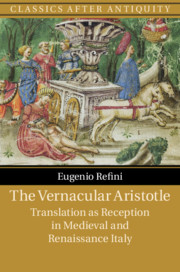Book contents
- The Vernacular Aristotle
- Classics after Antiquity
- The Vernacular Aristotle
- Copyright page
- Dedication
- Contents
- Figures
- Series Editors’ Preface
- Acknowledgements
- Notes on the Text
- Introduction
- Chapter 1 Taming the Philosopher
- Chapter 2 The Master of Those Who Know (and Those Who Don’t)
- Chapter 3 Family BusinessReadying the Ethics for the Layman
- Chapter 4 The Philosopher, the Humanist, the Translator and the Reader
- Chapter 5 Abridging the Philosopher(s)
- Conclusion
- Bibliography
- Index
Chapter 4 - The Philosopher, the Humanist, the Translator and the Reader
Published online by Cambridge University Press: 10 February 2020
- The Vernacular Aristotle
- Classics after Antiquity
- The Vernacular Aristotle
- Copyright page
- Dedication
- Contents
- Figures
- Series Editors’ Preface
- Acknowledgements
- Notes on the Text
- Introduction
- Chapter 1 Taming the Philosopher
- Chapter 2 The Master of Those Who Know (and Those Who Don’t)
- Chapter 3 Family BusinessReadying the Ethics for the Layman
- Chapter 4 The Philosopher, the Humanist, the Translator and the Reader
- Chapter 5 Abridging the Philosopher(s)
- Conclusion
- Bibliography
- Index
Summary
Chapter 4 studies the variety of reading practices that characterised the vernacular reception of Aristotle amidst the controversies between ‘traditionalists’ and ‘humanists’ in fifteenth-century Florence. The chapter examines the role played by vernacular translation as a facilitator for the interaction of the two different perspectives. Along with discussions of figures such as Domenico Da Prato and Leonardo Bruni, I explore the proactive role played by readers in shaping the boundaries of philosophical culture in the vernacular. To this purpose, special attention is given to the compositional strategies deployed by cultivated merchants in zibaldoni (notebooks) such as Giovanni Rucellai’s, where conflicts of cultures were resolved under the aegis of the layman’s curiosity. Similar preoccupations inform the manuscript transmission of Bernardo Nuti’s Italian translation of Aristotle’s Nicomachean Ethics (c. 1460). Extant manuscript copies of Nuti’s version (which was based on Leonardo Bruni’s ‘humanist’ rendering of the Ethics) have much to tell us about the social, ideological and political patterns that characterized the reception of Aristotle’s moral philosophy in the period.
Keywords
- Type
- Chapter
- Information
- The Vernacular AristotleTranslation as Reception in Medieval and Renaissance Italy, pp. 128 - 179Publisher: Cambridge University PressPrint publication year: 2020

